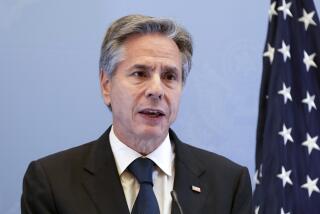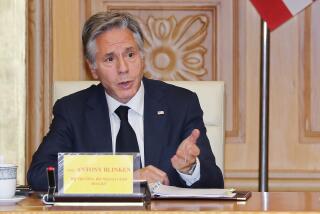In Iran, nuclear deal met with guarded enthusiasm
TEHRAN — The website known as Rajanews was less than thrilled with the interim nuclear accord worked out last weekend between envoys of Iran and six global powers.
“Only simple-minded people regard the deal as the beginning of the end of an unnecessary crisis,” an editorial writer at the politically conservative site declared. “Rather, it is the beginning of a new chapter of crisis.”
Moderates here generally lauded the landmark deal, and their enthusiasm seems to be shared on the streets of the Iranian capital, where many beleaguered residents have expressed hope that the era of international sanctions that have battered their nation’s economy is coming to an end.
“I already heard that Boeing company sold spare parts to Iran,” said one merchant here, his expectations clearly outpacing the deliberate and limited scope of sanctions relief afforded in the short-term nuclear agreement.
Skeptical hard-liners and even some moderates say Iran agreed to too many constraints on its nuclear development program while receiving limited sanctions relief, about $7 billion for the six-month duration of the interim accord. The vast majority of Iran’s $100 billion in foreign exchange holdings remains inaccessible or restricted by continuing sanctions.
“We are happy to have warded off the threat of war, but this was not an equal give-and-take,” said Farshad Qorbanpour, a journalist in the reformist camp. “We have given up much more than we have received in return.”
Supporters of recently elected President Hassan Rouhani generally agree that his negotiating team got the best outcome possible given decades of mistrust between the West and Iran. Backers of the deal said that Iran retained its “dignity” and its right to nuclear enrichment, though U.S. officials dispute that such a right exists.
The fact that Iran’s supreme leader, Ayatollah Ali Khamenei, wholeheartedly endorsed the deal undercut critics’ argument somewhat because questioning the judgment of the nation’s ultimate arbiter is taboo. Still, there was bound to be uncertainty and suspicion about an agreement with a sextet of nations that includes Iran’s longtime adversary, the United States.
“The problem is we do not know if what the supreme leader says is what he means or not,” said Nader Karimi Juni, who edits a reform-minded newspaper. “Maybe there is a hidden agenda out there. Maybe not.”
Western news reports that secret talks between U.S. and Iranian representatives began in March, well before Rouhani was elected in June, have added a touch of intrigue to the post-accord atmosphere. The reports of clandestine negotiations in Oman fit the narrative of conspiracy theorists and others dubious about the whole process.
“The deal was already fixed in March with the supreme leader’s endorsement and will not be nullified no matter how much the hard-liners here complain,” said Husain, a retired professor and business owner, who, like several others interviewed, did not want his last name used for privacy reasons.
The accord appears to have eased domestic discontent about the economy, at least for now. Thus one of the government’s main goals — placating a population restless because of relentless economic hardships — was achieved, though discontent lingers just below the surface.
Rouhani, a moderate cleric elected in a landslide on a platform of engaging the West and working to end sanctions, can now point to a major achievement barely 100 days into his presidency. Foreign Minister Mohammad Javad Zarif received a hero’s welcome Sunday evening when the negotiating team returned from Geneva.
Despairing Iranians seem content to latch on to the news of limited sanctions relief as a sign of better things to come in a nation whose currency, the rial, has lost much of its value in the last year, fanning inflation estimated at 40%. Few people interviewed here seem to expect a dramatic and sudden shift in their fortunes, despite the result in Geneva.
“If the rial is stabilized, we can be hopeful that within one year business will improve,” said Mostafa Akbari, who runs a paper import business. “Otherwise, we will be back to the same dire situation. The line between optimism and skepticism is very gray and can change overnight.”
Special correspondent Mostaghim reported from Tehran and Times staff writer McDonnell from Beirut.
More to Read
Start your day right
Sign up for Essential California for news, features and recommendations from the L.A. Times and beyond in your inbox six days a week.
You may occasionally receive promotional content from the Los Angeles Times.






